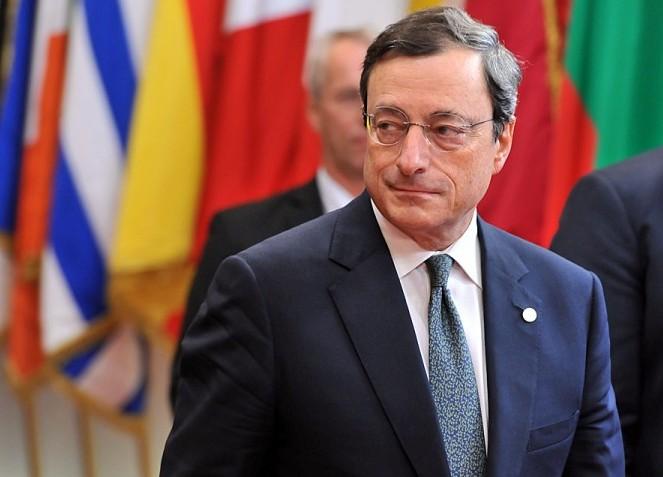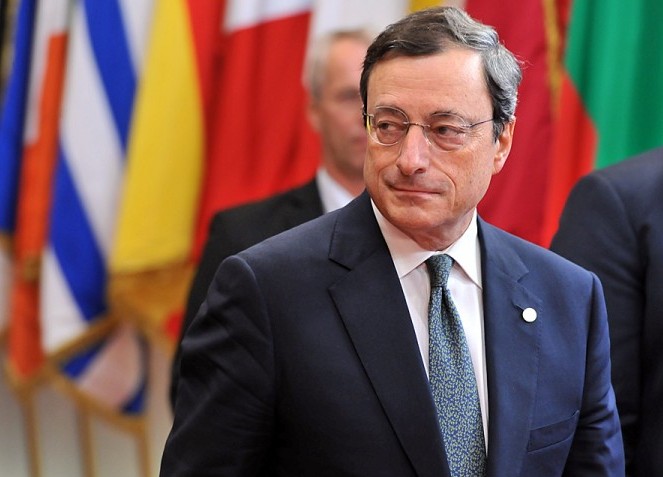AMSTERDAM—Economic data was again largely ignored last week as retail sales—minus 0.4 percent from a year ago versus minus 0.8 percent expected—for the 17 countries that share the euro currency came in above expectations and Germany’s industrial production and factory orders delivered a sound beat.
Exports, however, declined 3.6 percent in October compared to September whereas only a decline of 1.3 percent was expected.
The Euro Stoxx 50 benchmark equity index closed at 2,342 last Friday at exactly the same level compared to the previous week. This masks a bout of volatility, however, as the index dropped to 2,265 during the week before recovering last Friday. The euro currency gained 0.28 percent to close at $1.3370 travelling up to $1.3487, and then dropping to $1.3282 before recovering.
Banks Draw on Swap Lines as ECB Cuts Rates
The previous week, six global central banks with the U.S. Federal Reserve at the helm pledged to provide U.S. dollars to each other. As it has been explained in the previous edition of this column, European banks are in special need of dollar funding that the ECB cannot provide as readily as the Fed. The reduction of the rate on swaps was supposed to alleviate this problem and sure enough the banks gratefully took this chance to load up on cheap dollar funding.
According to data released by the ECB, a total of 39 European banks demanded $52.3 billion in dollar funding, most of it over a three-month period. This compares to two banks demanding $2 billion the week before. This exponential rise in demand for this type funding proves that European banks are virtually shut out of the cheaper interbank lending market and that the concerted central bank action came just in time to avoid major distress in this fragile sector. Goldman Sachs’s Jernej Omahan comments in a report that this measure will provide “easing of extreme funding tensions [which have] continued to build over recent weeks.”
In its rate decision last week, the ECB delivered on expectations of a 25 basis point cut and lowered its main refinancing rate to 1 percent from 1.25 percent. While this is the most obvious measure of easing, the ECB did not stop there. It also lengthened the maturity of these refinancing operations—banks now have 36 months to pay back the loans to the central bank—and relaxed collateral requirements, which will make it easier for distressed banks to post lower-rated credit such as asset-backed securities as collateral for receiving cash loans.
The ECB’s president Mario Draghi was more cautious about so called “nonstandard measures,” and told the press that those would be “temporary in nature,” and that he “didn’t signal more bond purchases [the week before]” when he was quoted saying that “other elements might follow” fiscal consolidation. Draghi made it clear that decisions by the ECB about further bond buying are going to be independent of any decisions reached at the European Union Summit that was held last weekend.
“The decisions of the ECB come as a significant relief for the eurozone banking system given the ongoing money market crunch and the drying up of unsecured bond issuance in recent months” writes Mizuho chief European Economist Riccardo Barbieri Hermitte.
New Stress Tests Do Not Calm Concerns
The European Banking Authority did publish a new version of its stress test which, says that write-downs on bad debt will cost European banks a total of 115 billion euros ($153.75 billion). This is higher than the last estimate, but will not change markets as the credibility of these tests has been called into questions by many analysts and observers.
Credit Suisse estimates the capital shortfall to be 400 billion euros ($534.8 billion) and previous versions of the stress test have seen banks such as Belgium’s Dexia pass with flying colors only weeks before they had to be nationalized.
EU Summit Moves Toward More Fiscal Integration
While the EU summit held in Brussels did not produce groundbreaking results, it was not a complete failure either.
As it has been previously pointed out, decision making in the 27-country bloc is extremely difficult as the unanimous voting procedure requires every country to consent to any changes. This time, it was British Prime Minister David Cameron who blocked an initiative by French President Nicolas Sarkozy and German Chancellor Angela Merkel to change the existing EU treaties in favor of more centralized fiscal power.
In a meeting last Monday, France and Germany had already agreed on pushing for a change of the EU treaties in order to implement harsher penalties for countries that do not comply with certain budgetary rules. Given the U.K.’s negative stance toward a treaty change, eurozone countries will now try to implement changes that they themselves can undertake adding other countries that would like to join if possible.
In a Twitter message, famous bond investor Bill Gross of Pacific Investment Management Co. quoted the U.K. 1980s television series “Yes Minister” to voice his concern about the results of the summit: “Oh what a tangled web the EU has weaved. Never ending story, hard to trust. Risk off.”
The Week Ahead
Next week will be relatively quiet as the market digests all of the ECB’s and EU’s actions.
The eurozone will release industrial production numbers, which might surprise positively given Germany’s beat earlier. There will also be important bond auctions as Italy, France, and Germany test the waters again after this week’s decisions.







